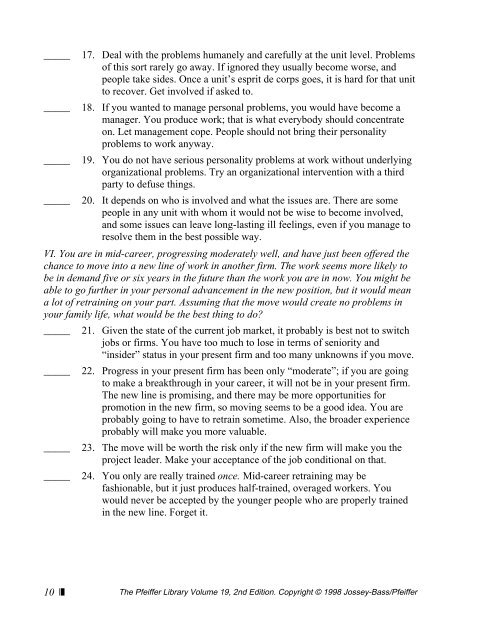motivational analysis of organizations
motivational analysis of organizations
motivational analysis of organizations
Create successful ePaper yourself
Turn your PDF publications into a flip-book with our unique Google optimized e-Paper software.
_____ 17. Deal with the problems humanely and carefully at the unit level. Problems<br />
<strong>of</strong> this sort rarely go away. If ignored they usually become worse, and<br />
people take sides. Once a unit’s esprit de corps goes, it is hard for that unit<br />
to recover. Get involved if asked to.<br />
_____ 18. If you wanted to manage personal problems, you would have become a<br />
manager. You produce work; that is what everybody should concentrate<br />
on. Let management cope. People should not bring their personality<br />
problems to work anyway.<br />
_____ 19. You do not have serious personality problems at work without underlying<br />
organizational problems. Try an organizational intervention with a third<br />
party to defuse things.<br />
_____ 20. It depends on who is involved and what the issues are. There are some<br />
people in any unit with whom it would not be wise to become involved,<br />
and some issues can leave long-lasting ill feelings, even if you manage to<br />
resolve them in the best possible way.<br />
VI. You are in mid-career, progressing moderately well, and have just been <strong>of</strong>fered the<br />
chance to move into a new line <strong>of</strong> work in another firm. The work seems more likely to<br />
be in demand five or six years in the future than the work you are in now. You might be<br />
able to go further in your personal advancement in the new position, but it would mean<br />
a lot <strong>of</strong> retraining on your part. Assuming that the move would create no problems in<br />
your family life, what would be the best thing to do?<br />
_____ 21. Given the state <strong>of</strong> the current job market, it probably is best not to switch<br />
jobs or firms. You have too much to lose in terms <strong>of</strong> seniority and<br />
“insider” status in your present firm and too many unknowns if you move.<br />
_____ 22. Progress in your present firm has been only “moderate”; if you are going<br />
to make a breakthrough in your career, it will not be in your present firm.<br />
The new line is promising, and there may be more opportunities for<br />
promotion in the new firm, so moving seems to be a good idea. You are<br />
probably going to have to retrain sometime. Also, the broader experience<br />
probably will make you more valuable.<br />
_____ 23. The move will be worth the risk only if the new firm will make you the<br />
project leader. Make your acceptance <strong>of</strong> the job conditional on that.<br />
_____ 24. You only are really trained once. Mid-career retraining may be<br />
fashionable, but it just produces half-trained, overaged workers. You<br />
would never be accepted by the younger people who are properly trained<br />
in the new line. Forget it.<br />
10 ❘❚<br />
The Pfeiffer Library Volume 19, 2nd Edition. Copyright © 1998 Jossey-Bass/Pfeiffer

















